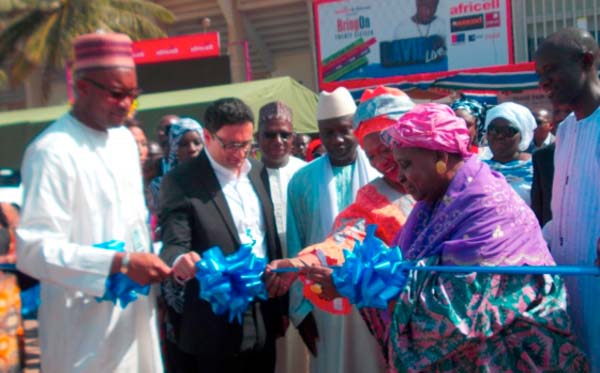
His statement was delivered yesterday by Vice President Isatou Njie-Saidy at the official opening of the 9th Edition of Trade Fair Gambia International (TFGI), organised by The Gambia Chamber of Commerce and Industry (GCCI), at the Independence Stadium in Bakau.
The TFGI has become the biggest private sector-led event in The Gambia, attracting large number of business and economic operators from both within and outside the country.
It showcases products and services of Gambian and international businesses and entrepreneurs, as well as attracts and facilitates partnerships between the public and private sector.
Billed to run from 19 December 2015 to 10 January 2016 at the Independence Stadium in Bakau, TFGI 2015 is rolled out on the theme: “Promoting Public Private Partnerships for National Development.”
Speaking at the opening ceremony, Vice President Njie-Saidy said: “We are all aware that significant and sustainable development in developing countries cannot be realized without the private sector’s participation.
She added that the private sector is the main engine for economic growth and development, as it allows entrepreneurs to set economic activities in motion by bringing resources together to produce goods and services.
“The Government of The Gambia in all its national development strategies in Vision 2020 and its medium term development frameworks recognize the need for strong partnership with the private sector to support the economic and social transformation of The Gambia for inclusive development,” the vice president said.
She added that it is in recognition of the important partnership between the public and the private sector that the government of The Gambia established the PPP unit under the Ministry of Finance and Economic Affairs, to facilitate public private sector partnerships in the country.
To nurture the growth of this partnership, she said, “Government has recently formulated a Public Private Partnerships policy framework that aims to improve the business environment, enhance trade and investment, as well as encourage private sector participation in the delivery of public infrastructure.
“The main objective of the PPP policy is to create an enabling environment and to facilitate private sector participation in upgrading, developing and expanding the infrastructure and services in The Gambia,” she said.
She further stated that through public private partnerships, the private sector can bring additional funding for public projects in addition to technical and managerial experience, adding that the underlying principle behind PPPs is that although the public sector may be responsible for the delivery of a particular service, it does not have to be responsible actually for providing the service or undertaking the investment on its own.
“All actors of a public private partnership can concentrate on doing what they are likely to do best,” she added.
Furthermore, she continued, the trade fair can promote the concept of ‘eat what you grow and grow what you eat’ and, therefore, create an opportunity to showcase Gambian products to a wider audience, which will go a long way in helping to realize the country’s poverty reduction strategies by creating a wealth of experience.
The vice president used this opportunity to again call on the private sector to consider investing in agriculture production, transformation and value addition.
As a country, “we cannot continue to rely on imports especially of basic food commodities, and therefore it is our collective responsibility to work towards food self-sufficiency”.
She added: “I, therefore, want to thank Gambia Chamber of Commerce and industry for identifying Public Private Partnerships for National Development as the theme for this year’s trade fair.
“Government will continue to work closely with GCCI to ensure that the right environment is created, and for the private sector to take advantage of these opportunities to expand their output.”
In his opening remarks on the occasion, GCCI’s president Muhammed Jagana said the trade fair is an opportunity for the promotion of trade and enhancement of market innovation, partnerships and networking, as well as to expand customer relationship and opportunities.
The trade fair, he added, creates job opportunities, reduces poverty and contributes to national development, even as it continues to empower women and the youths who are unemployed by engaging them in the business sector for a better Gambia.
He added that GCCI will continue to partner with the government and the private sector to support national development in the country.
According GCCI, TFGI 2015/16 has so far registered the highest number of stalls (about 300) booked by participants at the trade fair.

